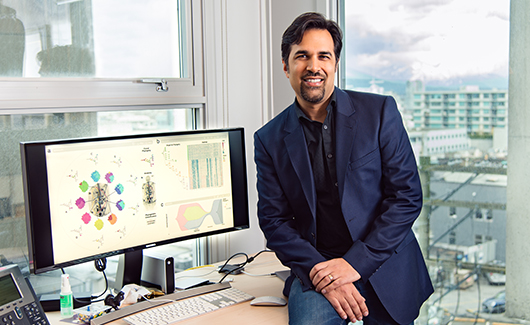April hosts Daffodil Days – the floral symbol that marks our united fight against cancer. Associate Professor, Dr. Sohrab Shah is tackling this disease one cancer cell at a time.
Through computational analysis, Dr. Shah is examining the DNA of single cells in ovarian and breast cancers to better understand how cancer cells start, why they change and how they respond to treatment.
We sat down with Dr. Shah to find out more about his work and why he thinks genomics will tip the scales in beating cancer.

Sohrab Shah
Tell us about your background and what sparked your interest in cancer genomics.
My first degree is in biology but I was always interested in computer science too, so I pursued that as a second path. What’s interesting is that at the time, the Human Genome Project was fast becoming a major scientific achievement that essentially gave rise to the field of bioinformatics – the merging of biology and computer science.
Similarly to the evolution of other species, cancers are evolving systems that accumulate mutations and change overtime. By using DNA sequencing, we can study the genetic material or DNA of a single cancer cell to better understand how it starts, why it changes and spreads, and how it responds to treatment. We do this by taking a lot of DNA measurements and using sophisticated computational methods to interpret the biology.
We primarily study ovarian and breast cancers. Even though every cell is different and every individual’s cancer is different, there are some common properties and our hope is to find these commonalties and vulnerabilities and see if they can be translated into other tumour types like in prostate and lung cancers.
What are you working on now?
We want to know what drives cancer relapse, so we are currently studying how cancer cell populations – at the single cell level – respond to drug interventions.
We have been developing technology that can faithfully measure and observe the genomes of individual cancer cells. This allows us to follow these cancer populations over time to learn how many cancer cells die during treatment and what drives other cells to survive the therapy.
If we can understand this, then we can start building predictive tools or combination therapies that will be more effective at treating patients likely to relapse in the context of a specific therapy.
How do you think genomics will affect how we diagnose and treat cancer in the future?
The changes that cancer cells undergo are already written in the cells’ genomes. If we can read the genomes, we have the best chance of understanding its biology and which therapies will be most effective.
But what’s important to understand is that in order to drive this research forward – we have to encourage interdisciplinary science. There is an incredible spectrum of activity that happens from the time a patient’s tissue is collected to the time my team and I do computational analysis. There is a clinical assessment, surgery, diagnosis through a pathologist, DNA extraction from a molecular biologist, etc.
For students who are interested in pursuing cancer research like myself, it’s so important to have some degree of knowledge across the spectrum of disciplines – it’s the interdisciplinary teams we currently have in place that has led to our success.
Dr. Sohrab Shah is an Associate Professor in the Departments of Pathology & Laboratory Medicine and Computer Science. He is also a Scientist at the BC Cancer Agency. He is the recipient of a Canada Research Chair in Computational Cancer Genomics, a Terry Fox New Investigator Award and is a Michael Smith Foundation for Health Research Career Investigator. Dr. Shah’s work has been featured in the New England Journal of Medicine and in Nature.